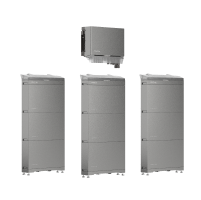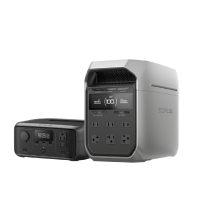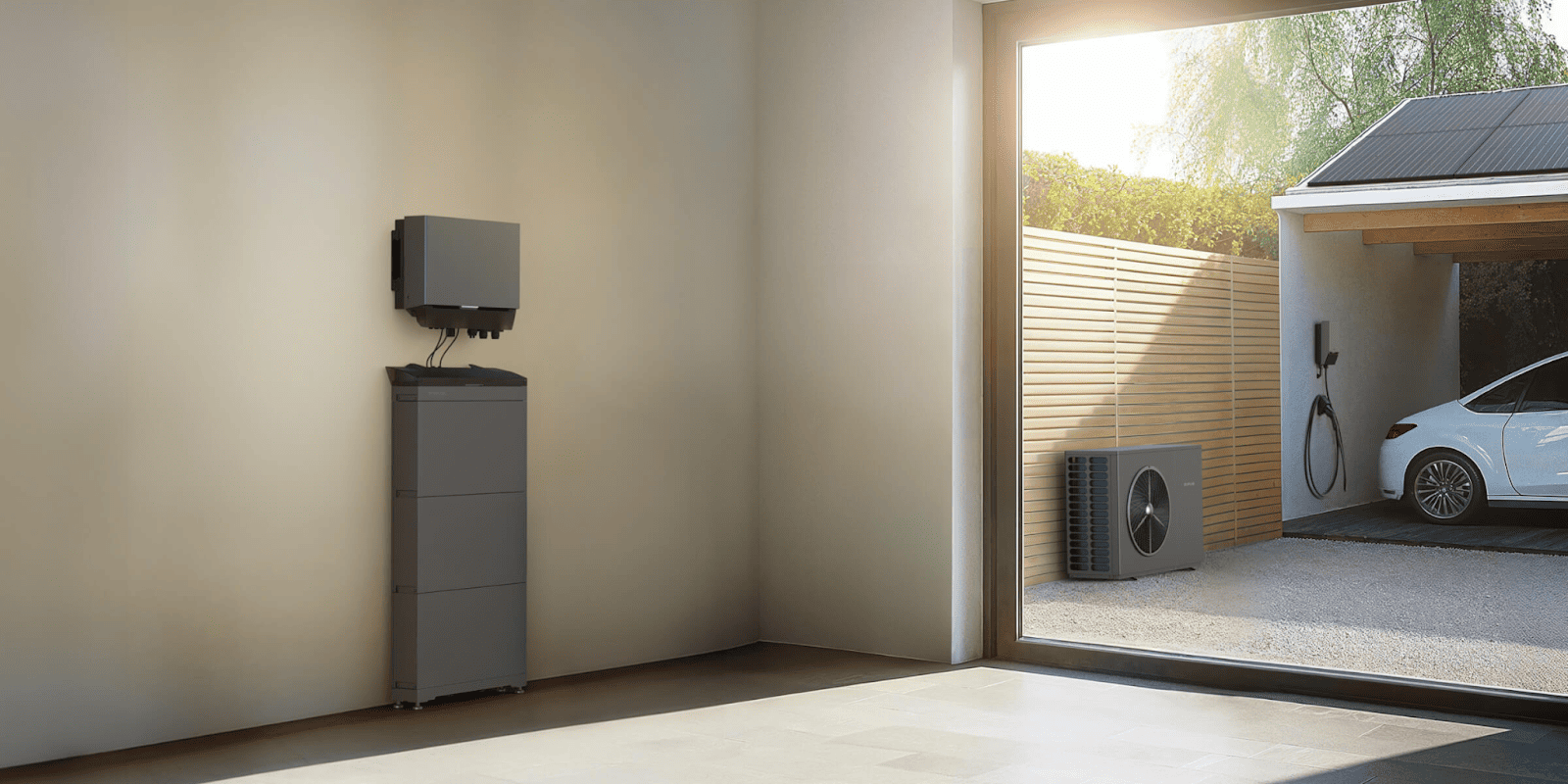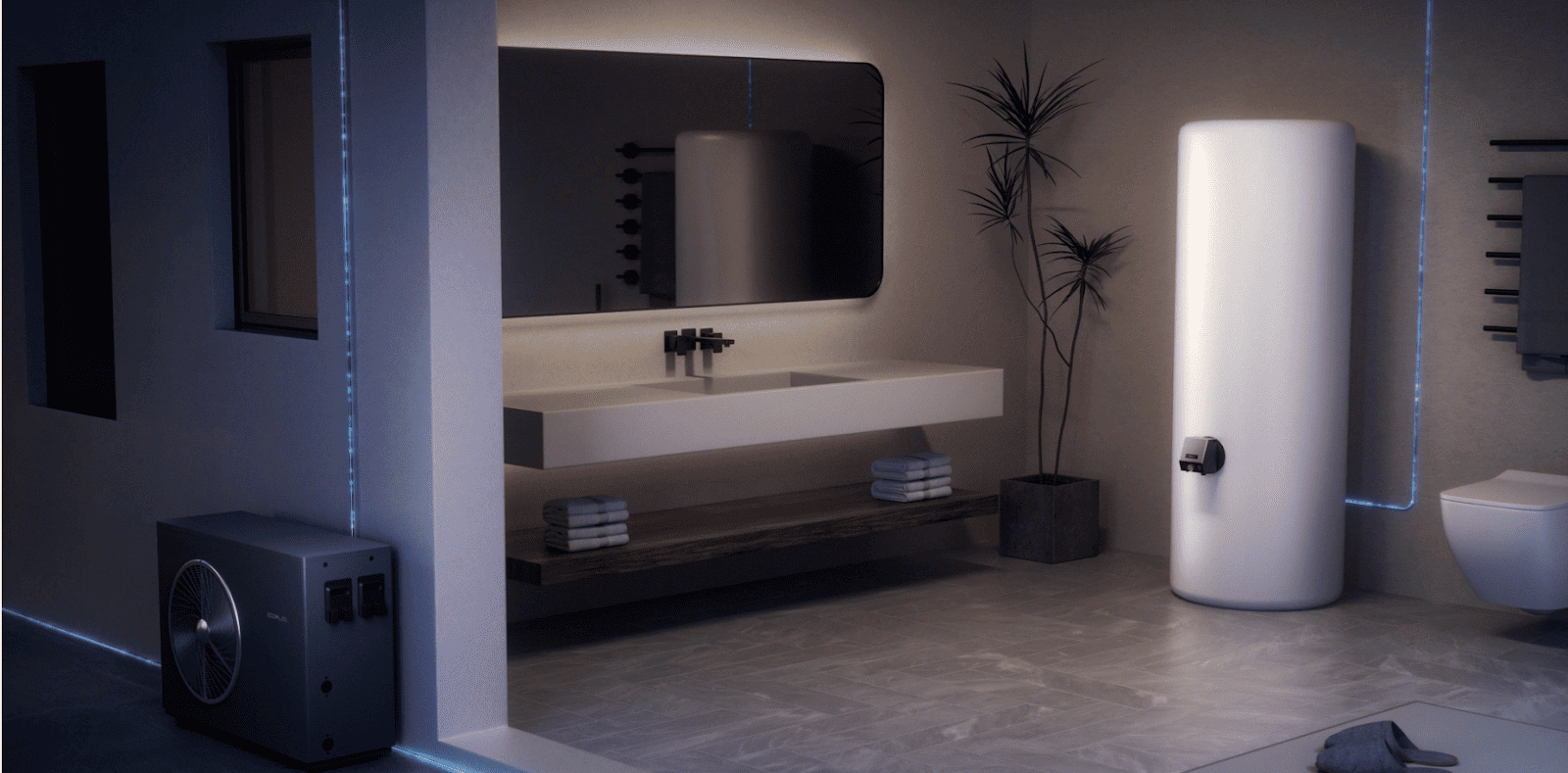Electric vs Hybrid Heat Pump: What Are Their Advantages and Disadvantages?
Choosing between an all-electric heat pump and a hybrid heat pump can absolutely feel like a major decision for many UK households. While both options offer ways to lower carbon emissions and boost energy efficiency, their costs, efficacy, and suitability differ significantly.
Discover the benefits and drawbacks of each system, so you can decide whether electric or hybrid power is a better choice for your home.
What’s the difference between electric and hybrid heat pumps?
An electric system composed of a stand-alone air- or ground-source heat pump uses renewable energy from the air or ground to heat your home and supply hot water. With electricity bills on the rise, electric heat pumps are known to be an energy-efficient alternatives for your home. Meanwhile, a hybrid heat pump works differently: it pairs a heat pump with a boiler, which could be gas, oil, or LPG.
In a hybrid heat pump system, smart automatic controls decide which source should operate at any given time. The system makes decisions based on whether the house needs heating, the outside weather, or even energy tariffs. For example, in mild weather, the heat pump may effectively handle all of the heating, but in colder months or during periods of high demand, the boiler takes over to provide extra assistance.
A hybrid air source heat pump and gas boiler combination allows UK households to keep the comfort and familiarity of a traditional boiler while also benefiting from renewable energy-based heating. Despite its versatility, this blend necessitates mastering cost, carbon, and maintenance considerations.
All-electric heat pump: Advantages and Disadvantages
All-electric heat pumps are gaining popularity as the UK transitions away from fossil fuels. EcoFlow PowerHeat, an efficient air-source heat pump, is a good example of this technology. Without requiring a backup boiler, it provides hot water and thermal comfort, making it a straightforward and more cost-efficient choice.
Designed to extract heat from outdoor air, PowerHeat represents how an all-electric system can integrate into UK homes. As the grid decarbonises, these technologies are seen as central to the country’s long-term heating transition. PowerHeat also utilizes solar energy, providing efficient and clean heating with a global warming potential (GWP) of less than 20.
Advantages of an all-electric heat pump
A key advantage of choosing an all-electric heat pump is its eligibility for the UK’s Boiler Upgrade Scheme (BUS) grant of up to £7,500, making installations more affordable. The system itself is also simpler: just one appliance, one set of controls, and fewer moving parts overall.
For homeowners seeking to reduce their long-term emissions, the benefits of electric heat pumps are substantial. As the UK’s power grid continues to decarbonise, the lifetime carbon footprint of an all-electric system falls steadily, making it a more sustainable investment.
EcoFlow PowerHeat, for example, offers efficient performance and aligns neatly with future energy and climate policy goals. It also comes with an integrated inverter technology, which ensures constant indoor system temperatures in your home.
Disadvantages of an all-electric heat pump
Going entirely electric also has drawbacks despite its many advantages. Since heat pumps run at lower flow temperatures than conventional boilers, many homes may require underfloor heating or possibly radiator improvements to ensure continued optimal operation.
This means more upfront disruption and cost. Hot-water recovery can also be slower unless the cylinder and controls are carefully optimised, which may not suit every family’s lifestyle.
Hybrid heat pump: Advantages and Disadvantages
EcoFlow’s PowerHeat can also form part of a hybrid heat pump system, demonstrating the flexibility of pairing an air-source heat pump with an existing gas or oil boiler. This arrangement provides a flexible, transitional pathway for households hesitant about going fully electric while still lowering reliance on fossil fuels compared with a conventional boiler-only setup.
What kind of product or solution are you interested in?


Advantages of a hybrid heat pump system
A hybrid heat pump works particularly well in “hard-to-treat” homes with poor insulation, where an all-electric option might struggle. Disruption is lower because the boiler continues to handle peak heating demand and domestic hot water production.
This ensures continuity of comfort, even in cold snaps when the heat pump alone could be insufficient. For households exploring a hybrid air source heat pump and gas boiler, the approach provides reassurance that their heating needs will always be met without major upgrades.
Disadvantages of a hybrid heat pump
Unlike electric-only systems, hybrid heat pumps are not eligible for the Boiler Upgrade Scheme, leaving homeowners to cover the full installation bill, typically higher than electric alternatives.
Having two systems also means more complexity, greater servicing needs, and increased potential for breakdowns. More significantly, hybrids continue to burn non-renewable sources of energy like gas, oil, and LPG. This raises long-term concerns about carbon emissions and future policy risks, as regulations may penalise ongoing reliance on fossil fuel heating.
Costs, grants, and financial considerations
When comparing financials, typical install costs average around £11,000 for an electric air-source heat pump, while a hybrid heat pump system can range from £12,000 to £15,000 depending on configuration.
Grants tilt the scales: all-electric systems benefit from the Boiler Upgrade Scheme, offering £7,500 toward costs, but hybrids do not qualify. Running expenses also vary.
For electric units, efficiency depends heavily on keeping flow temperatures low and optimising the heating curve. For hybrids, switching logic and energy tariffs determine which source runs, affecting monthly bills.
For example, if gas prices rise significantly, a hybrid air source heat pump and gas boiler may become less economical. Conversely, optimising an electric system with the right controls can maximise efficiency and lower bills over the long term. Ultimately, finances often push households toward all-electric options, unless specific property constraints make a hybrid heat pump more practical in the short term.

Which system suits your property?
Every home has unique requirements, and choosing between electric and hybrid heat pump solutions is highly dependent on what your property type is. An electric heat pump is usually the best option for well-insulated homes or properties already set up for emitter upgrades like underfloor heating.
EcoFlow’s PowerHeat can offer highly efficient heating for properties that meet these standards. It can also further enhance your system with EcoFlow PowerGlow, a smart immersion water heater. By contrast, a hybrid air source heat pump and gas boiler suits properties with high heating demand, limited retrofit options, or owners seeking “boiler-like” performance.
For households willing to embrace a low-carbon future, an all-electric path aligns best with grants and long-term policy, while a hybrid heat-pump system provides a transitional compromise with fewer immediate changes required.
Operation and maintenance
Whichever system you choose, correct commissioning and setup are vital for long-term performance.
Both electric and hybrid heat pump systems require weather compensation—also known as a heating curve—so the system adapts to outside conditions and maintains steady comfort indoors. This ease of upkeep adds to their appeal.
In contrast, a hybrid heat pump comes with more responsibility. Because it combines two technologies, both the boiler and the heat pump must be maintained, serviced, and managed. This means higher service costs and a greater likelihood of component issues over time.
While neither system is overly demanding, the simpler servicing of a single all-electric unit typically makes it less expensive and less hassle in the long run.
Key takeaways: Electric heat pumps are more future-proof
The evidence strongly suggests that electric heat pumps are the more future-proof option. They align with UK policy, benefit from generous grants, and deliver progressively lower lifetime carbon emissions.
By contrast, hybrids provide short-term flexibility but continue to lock homes into fossil fuel use, with all the financial and policy risks this entails. Ultimately, the right choice comes down to your property’s insulation, heating system, and hot-water needs.
FAQ
1. Are hybrid heat pumps cheaper to run than electric ones?
Not always. Running costs depend on gas and electricity tariffs, flow temperatures, and switching logic. Hybrid heat pumps may help in cold snaps, but all-electric systems can be cheaper long-term as the grid decarbonises.
2. Do hybrid heat pumps qualify for government grants?
No. The Boiler Upgrade Scheme (BUS) currently supports only all-electric air- or ground-source heat pumps, with grants of up to £7,500. Hybrid heat pumps are excluded from these incentives. The grant’s purpose is to encourage renewable technologies.
3. Can a hybrid heat pump work with my existing boiler?
Yes. For homes where replacing the boiler right away isn't feasible, a hybrid heat pump is a good alternative because it can be used with a variety of existing systems. However, check if your specific boiler is compatible with a hybrid system.



